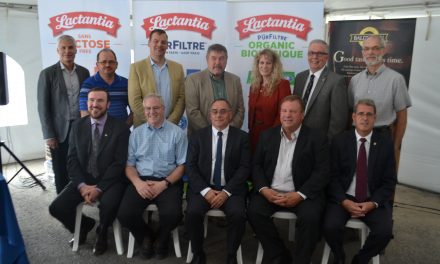Starting out right
Robin Turner, NCC representative at the Eco Farm Days in Cornwall was on hand to advocate for agricultural rental properties along Ottawa’s Greenbelt. Van Dusen photo
CORNWALL – The National Capital Commission doesn’t normally participate in agricultural trade shows yet there it was, front and centre, at the recent Eco Farm Days conference with a booth and on the presenters’ list promoting agricultural rentals in Ottawa’s Greenbelt.
Booth staffer and presenter Robin Turner, who spends two days a week away from his Roots & Shoots Wakefield farm working for the NCC on the agricultural properties portfolio, said this marked the first time the FCC attended the event.
Turner was on hand to publicize the NCC’s bank of some 80 rental farm properties scattered across the Greenbelt, ranging in size from three to 300 acres, many including homes and/or outbuildings. In all, the Greenbelt contains about 13,340 acres of good quality farmland. Most are currently rented with a waiting list.
Turner also spoke to the pros and cons of renting as opposed to owning farmland. He was the ideal NCC rep in that he’d done it all himself, farmed successfully on non-NCC rented land on Ottawa’s Mitch Owens Road before moving on to buy his own place along with his partner.
With the small farm and local food movements going strong, the commission has discovered the merits of local agriculture and how it fits tidily into its Greenbelt holdings; it has even initiated a Sustainable Agriculture and Food Strategy and a rehabilitation project for some 84 heritage barns.
The NCC is well placed to cater to farmers who in turn are catering to the local food movement. Its Greenbelt properties are close to restaurants and institutions that small produce market farmers serve; quick turnaround is essential, making delivery times important.
Turner made a financial case in favour of leasing over owning when starting out in small farming. Using his own example when Roots & Shoots was located on Mitch Owens, he was able to secure a favourable lease from a private owner and use the funds he didn’t have to invest into ownership to set up the 22-acre operation with equipment, greenhouses and other buildings.
When the time came to pull up stakes, Turner was grossing $350,000 a year servicing 500 families under a Community Supported Agriculture program; he was able to sell his equipment and buildings to another farmer coming on to the 22 acres for the $35,000 he invested while keeping and relocating two of his greenhouses. Although he didn’t own the land, he was able to borrow against his successful farming operation to assist in buying his Wakefield property.
Turner claimed it’s typical for the commission to want agricultural tenants to succeed; he and two others work on the agricultural properties portfolio, selling the concept of starting into rental farming in the Greenbelt: “There’s something for every farmer,” their pamphlet touts in two languages.”













